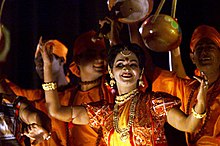Nazrul Sangeet
| Music of Bangladesh | |
|---|---|

|
|
| Genres | |
| Specific forms | |
| Religious music | |
| Ethnic music | |
| Traditional music |
|
| Media and performance | |
| Music awards | |
| Music festivals | |
| Music media |
Radio Television Internet |
| Nationalistic and patriotic songs | |
| National anthem | Amar Sonar Bangla |
| Other |
Notuner Gaan (National March) Ekusher Gaan (Ode to the Language Movement) |
| Regional music | |
| Related areas | |
| Other regions | |
Radio
Television
Internet
Nazrul Geeti (Bengali: নজরুল গীতি) or Nazrul Sangeet (Bengali: নজরুল সঙ্গীত), literally "music of Nazrul", refers to the songs written and composed by Kazi Nazrul Islam, a Bengali poet and national poet of Bangladesh and active revolutionary during the Indian Independence Movement. Nazrul Sangeet/Geeti incorporate revolutionary notions as well as more spiritual, philosophical and romantic themes. Nazrul wrote and composed nearly 4,000 songs (including gramophone records), which are widely popular in India and Bangladesh.
Nazrul showed the symptoms of keen poetic and musical talent at his tender age and started writing songs when he was a member of a Leto group (Folk Musical Group). Following Kazi Bazle Karim, his uncle and a leader of a Leto group, he became expert in composing songs and setting them to tunes. Joining Leto group enhanced his musical career and put a significant impact on shaping his future musical life. At very young age he was excelled in composing songs in different languages, apart from Bengali language. He met Satish Kanjilal, a teacher of Searsol School who had interest in classical music and some mastery over it. Observing Nazrul's irresistible inclination to music, Mr. Kanjilal imparted him some lessons on classical music. Later Nazrul widened his knowledge on music when he was serving as a Havilder in Karachi Barrack under Bengal Regiment. He learned a great deal of Persian language, literature and music with the help of a religious teacher from Punjab attached with the regiment.
The Mass music and poems of Kazi Nazrul Islam have been widely used during the Indian Independence Movement and Bangladesh Liberation War. The music is highly motivational and revolutionary in nature with strong and powerful words and captivating tunes. It talks about the extremities of everything. The lyrics of those songs are provoking, as they talk against conservatism and about life on a broader parameter of philosophy and spirituality. The beauty of Nazrul's mass music lies in the freedom of its expression, which also drew immense criticism. However, those who understood its philosophy praised the courage and straightforwardness.
...
Wikipedia
